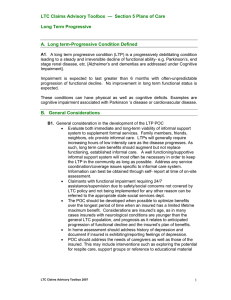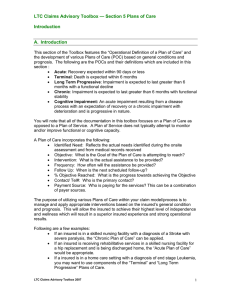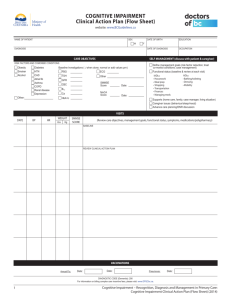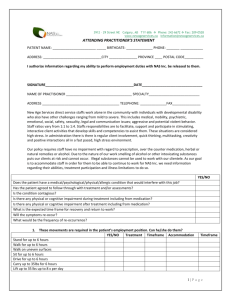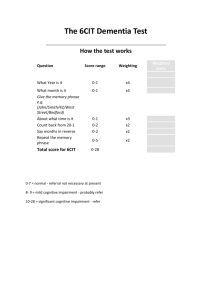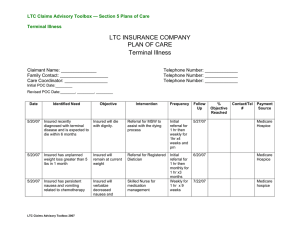LTC Claims Advisory Toolbox — Section 5 Plans... Cognitive Impairment A. Cognitive Impairment Defined
advertisement
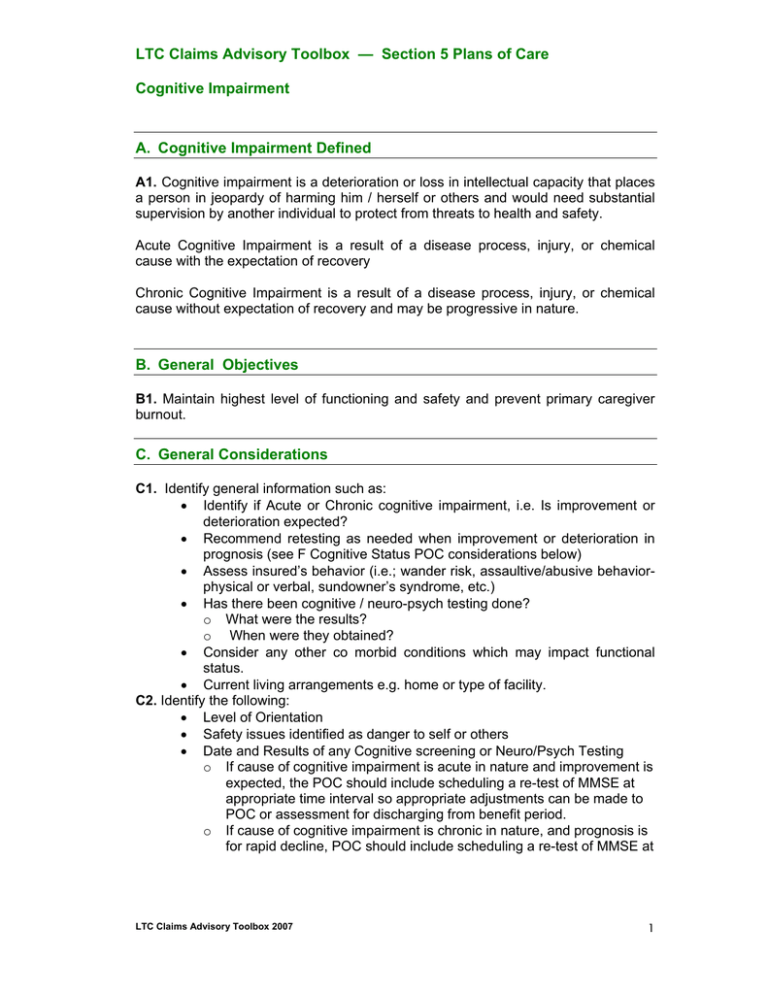
LTC Claims Advisory Toolbox — Section 5 Plans of Care Cognitive Impairment A. Cognitive Impairment Defined A1. Cognitive impairment is a deterioration or loss in intellectual capacity that places a person in jeopardy of harming him / herself or others and would need substantial supervision by another individual to protect from threats to health and safety. Acute Cognitive Impairment is a result of a disease process, injury, or chemical cause with the expectation of recovery Chronic Cognitive Impairment is a result of a disease process, injury, or chemical cause without expectation of recovery and may be progressive in nature. B. General Objectives B1. Maintain highest level of functioning and safety and prevent primary caregiver burnout. C. General Considerations C1. Identify general information such as: • Identify if Acute or Chronic cognitive impairment, i.e. Is improvement or deterioration expected? • Recommend retesting as needed when improvement or deterioration in prognosis (see F Cognitive Status POC considerations below) • Assess insured’s behavior (i.e.; wander risk, assaultive/abusive behaviorphysical or verbal, sundowner’s syndrome, etc.) • Has there been cognitive / neuro-psych testing done? o What were the results? o When were they obtained? • Consider any other co morbid conditions which may impact functional status. • Current living arrangements e.g. home or type of facility. C2. Identify the following: • Level of Orientation • Safety issues identified as danger to self or others • Date and Results of any Cognitive screening or Neuro/Psych Testing o If cause of cognitive impairment is acute in nature and improvement is expected, the POC should include scheduling a re-test of MMSE at appropriate time interval so appropriate adjustments can be made to POC or assessment for discharging from benefit period. o If cause of cognitive impairment is chronic in nature, and prognosis is for rapid decline, POC should include scheduling a re-test of MMSE at LTC Claims Advisory Toolbox 2007 1 LTC Claims Advisory Toolbox — Section 5 Plans of Care Cognitive Impairment appropriate time interval so appropriate adjustments can be made to POC. C3. Medication safety should be considered as many cognitively impaired individuals have extensive medication regimes, numerous ordering physicians and frequent medication changes. The potential for polypharmacy always exists. It is most often best to work through the primary caregiver to ensure that all physicians caring for the insured are aware of all medications being taken by insured. However if the caregiver is unavailable or unable to perform this task, the POC should address how this information will be conveyed to those physicians caring for the insured. D. Activities of Daily Living D1. Identify if the insured is capable of performing any ADLs. If not then: • Identify the ADLs insured needs help with (see OSA) • What type of assistance does insured require (hands on, Cueing, Standby) • Who provides the ADL assistance • How often is the assistance needed • Is improvement expected? E. Instrumental Activities of Daily Living E1. Identify if the insured is capable of performing any IADLs. If not then: • Identify the IADLs insured needs help with (see OSA) • Who provides the IADL assistance • How often is the assistance needed • Is improvement expected? • Is assistance needed with medication management? – medication safety should be considered as many insureds have extensive medication regimes, numerous ordering physicians and frequent medication changes. F. Environmental F1. Refer to the OSA for specific documentation of information on: • Is there an Informal support system in place? • Identify family dynamics, psycho-social issues. • Consider safety hazards in the home (see below place of care considerations). • Are paid services currently in place? • Facilitate access to community services such as Local Alzheimer’s Assoc. Chapter, Safe Return Program, community drop-in visitation programs. • What are the payment sources available for services required? LTC Claims Advisory Toolbox 2007 2 LTC Claims Advisory Toolbox — Section 5 Plans of Care Cognitive Impairment G. Place of Care G1. It would be important to consider the goals of the family, and insured if capable. If there is a stay at home focus, the POC should include all services (paid and unpaid) to ensure maintenance of the highest level of function, activity and safety. The primary unpaid caregiver’s needs should also be considered. Information including educational brochures, Safe Return information, websites and local support groups should be provided, along with a plan to provide respite as needed. Discussion regarding respite through the use of adult day care centers in combination with in home services will prove beneficial for the caregiver. G2. Discussion with family caring for insured at home should acknowledge that a progression of illness may eventually lead to a facility placement. If a decision is eventually made for placement, let them know you can assist with locating several eligible facilities. Provide educational information to assist with the decision of finding a facility to meet their individual needs and preferences. G3. Discussion of safety factors in the home should be addressed which may include removing stove knobs, turning the temperature down on the hot water source, securing medications and potential harmful chemicals if swallowed, checking the refrigerator for spoiled food, door alarms, wandergards, and any safety concerns for the overnight. G4. Measures to maintain orientation to time may be placed in the home such as a poster, chalk board etc which posts the Day, Date, and other information as needed. G5. Consider information on the setting in which care is provided when developing the POC: • Care At Home o Does insured live with / without family? o What type of dwelling does the insured live in? o Is the dwelling in an urban or rural setting? o What is the availability of community services- both covered and uncovered? • Facility Based Care o Does the facility have a designated? o If in a nursing Facility what level of facility e.g. skilled, intermediate, dementia unit, etc. is the insured residing in? o If in an assisted living facility, is there a dementia unit and if yes is that where the insured resides? LTC Claims Advisory Toolbox 2007 3
